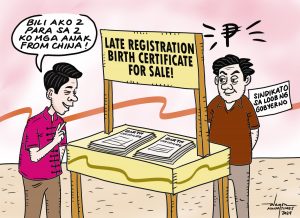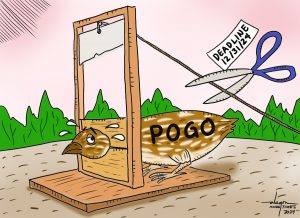By Herman M. Lagon
In Philippine traditional politics, the early bird does not just catch the worm; it builds a nest on every street corner, billboard space, and social media newsfeed available.
Yes, it is election season again—or rather, the pre-pre-election season, where politicians start their subtle yet blatant courtship of voters more than a year before the voting day. It is a “silent loudspeaker,” these tarps and social media posts scream concern (“Ingat sa Biyahe” Lenten Season tarps), piety (featuring self “passionately” carrying the cross on Instagram), righteousness (posting Bible verses on Facebook), generosity (dole-outs everywhere), presence (public omnipresence in baptisms, birthdays, graduations, weddings, and funeral services), and service (sudden advocacy for world peace, social justice, or the marginalized) without saying and doing anything of substance. It is a delightful paradox of being everywhere yet nowhere, touching on what matters to the electorate. Amidst this traditional political fanfare, it is crucial to acknowledge the rare gems—candidates emerging from political dynasties or, better yet, otherwise—who genuinely aspire to serve with sincerity, competence, and unselfishness. Their presence offers hope in a landscape often marred by self-serving agendas.
Then, the grand tradition of political dynasties offers the paradox of choice without choice. It is like being hungry and offering a menu listing the same dish under different names. The promise of “fresh leadership” from the same old bloodlines is as refreshing as reheated coffee, promising a new flavor with the same bitter aftertaste. It is the “same difference,” yet the electorate is expected to swallow it, hoping it will taste different this time. However, it is worth noting that not all political dynasties wear the same cloak; a few defy the odds, choosing to tread a path marked by genuine service and visionary leadership, setting themselves apart in a sea of sameness.
As candidates prepare, we witness the “loud silence” on actual policy or change. Slowly, the air is filled with the noise of campaigning—jingles, banners, and the ever-constant stream of social media updates—yet, when it comes to substantial discussions on addressing the local, national, and international issues, crickets could be heard in the background. It is a masterclass in saying much without saying anything, a performance art piece entitled “The Sound of Silence.” In this cacophony, the sincere voices of a few candidates, earnest in their desire to address real issues, often get drowned out, yet they persist, hoping to connect with those voters yearning for substantive change.
Amidst this, subtle pre-election campaign promises of ‘honest lies’ bloom like sunflowers. Slowly, we now see and hear presumptive candidates, with the help of expensive branding and marketing experts and companies, promising the moon with plans as concrete as a cloud. They pledge to fight corruption, poverty, and injustices with the enthusiasm of a televangelist who claims he is the Messiah, yet their track records often tell a different story. It is a paradoxical promise of change that constantly maintains the status quo. Yet, amid these grandstanding gestures exist candidates whose promises are rooted in actionable plans and past achievements, shining beacons of hope in a landscape often characterized by empty rhetoric.
The “budots” of the uncommitted candidates is a spectacle to behold. They flirt with the idea of running, coyly saying they are considering the people’s calls for their leadership. It is a “definite maybe” that stretches on, a commitment to non-commitment that keeps everyone guessing. This dance is as intricate and bewildering as a telenovela plot, leaving the unlisted audience both frustrated and hooked. However, amidst this indecisiveness, a few stand firm in their convictions, committed to their platforms from the get-go, not as a strategic maneuver but as a testament to their steadfast commitment to serve for and with others.
Then, there is the grassroots campaign that is anything but grassroots. Funded by millions, usually from kickbacks and people’s taxes, these subtle but creepingly systematic campaigns are as “grassroots” as synthetic grass. They speak of humble beginnings, and the common touch, yet the scale and gloss of their operations suggest otherwise. It is a paradoxical blend of pretending to be of, with, and for the people while floating so high above them that they need binoculars to see the ground. Yet, in this mirage of faux-grassroots efforts, genuine candidates emerge, their campaigns powered by the actual support of the communities they wish to serve, embodying the true spirit of “for the people.”
Suddenly, every candidate becomes as accessible as the nearest 7-11, ready with a smile and a handshake for every photo op. This “accessible inaccessibility” flips post-election when they become as elusive as a Pokémon in the rarest of games. This transformation is not so much a caterpillar into a butterfly but more of a chameleon changing colors to blend in with the political wallpaper. Still, a select few remain accessible; their pre-election visibility is not a campaign strategy but a continuation of their ongoing engagement with the communities they serve.
Promises of radical change are as reliable as a mirage in the desert. Every election cycle, candidates promise to shake the foundations of the political landscape, to be the storm that uproots decades of stagnation. Yet, once in office, this “revolutionary conservatism” settles in, and the storm becomes a gentle breeze, barely rustling the leaves of the status quo. However, amidst these often-repeated promises, some candidates stand out for their commitment to tangible reforms, having laid down the groundwork long before the campaign season began, offering hope and a track record of real change.
The cult of personality trumps the cult of policy every time. Candidates become celebrities, their faces plastered everywhere, their personal lives fodder for public consumption. It is “political idolatry,” where the issues take a backseat to the soap opera of political lives, leaving the electorate entertained but uninformed. Yet, in this age of personality politics, some candidates strive to shift the focus back to the issues, their campaigns centered not on themselves but on the policies and programs that matter to the electorate.
So, the electorate faces the “paradox of choice”—an array of candidates who promise different paths but mostly walk the same road. It is a buffet where every dish is rice in various shapes and forms, leaving voters hungry for variety and substance. Yet, this paradox also includes candidates who offer a genuine alternative, their platforms, and visions distinct and refreshing in a political menu often filled with the same old offerings.
Despite all this, there is a strange “optimistic pessimism” among the voters. They criticize, joke, and despise the state of politics, yet they line up dutifully, casting their votes in the hope that this time will be different. It is a collective leap of faith, a belief in the possibility of change despite all evidence to the contrary. Among these hopeful voters are those who recognize and support the few worthy candidates, understanding that amidst the paradoxes of political campaigning, the seeds of genuine leadership can still be found.
The early campaigning season for our April 2025 midterm elections is a masterclass in paradoxes. It is a time when politicians perform mental gymnastics–via traditional or online means–to appear relatable yet distinguished, to promise change while upholding the status quo, and to be everywhere yet say nothing of substance. It is a circus that the electorate watches with a mix of amusement and resignation, hoping for a finale that somehow, against all odds, delivers something genuinely different. Amidst this traditional parade of paradoxes, it is still essential to remain vigilant and discerning, recognizing those few candidates whose integrity, sincerity, and dedication to public service shine brightly against political theatrics.
***
Doc H fondly describes himself as a ‘student of and for life’ who, like many others, aspires to a life-giving and why-driven world that is grounded in social justice and the pursuit of happiness. His views herewith do not necessarily reflect those of the institutions he is employed or connected with.


